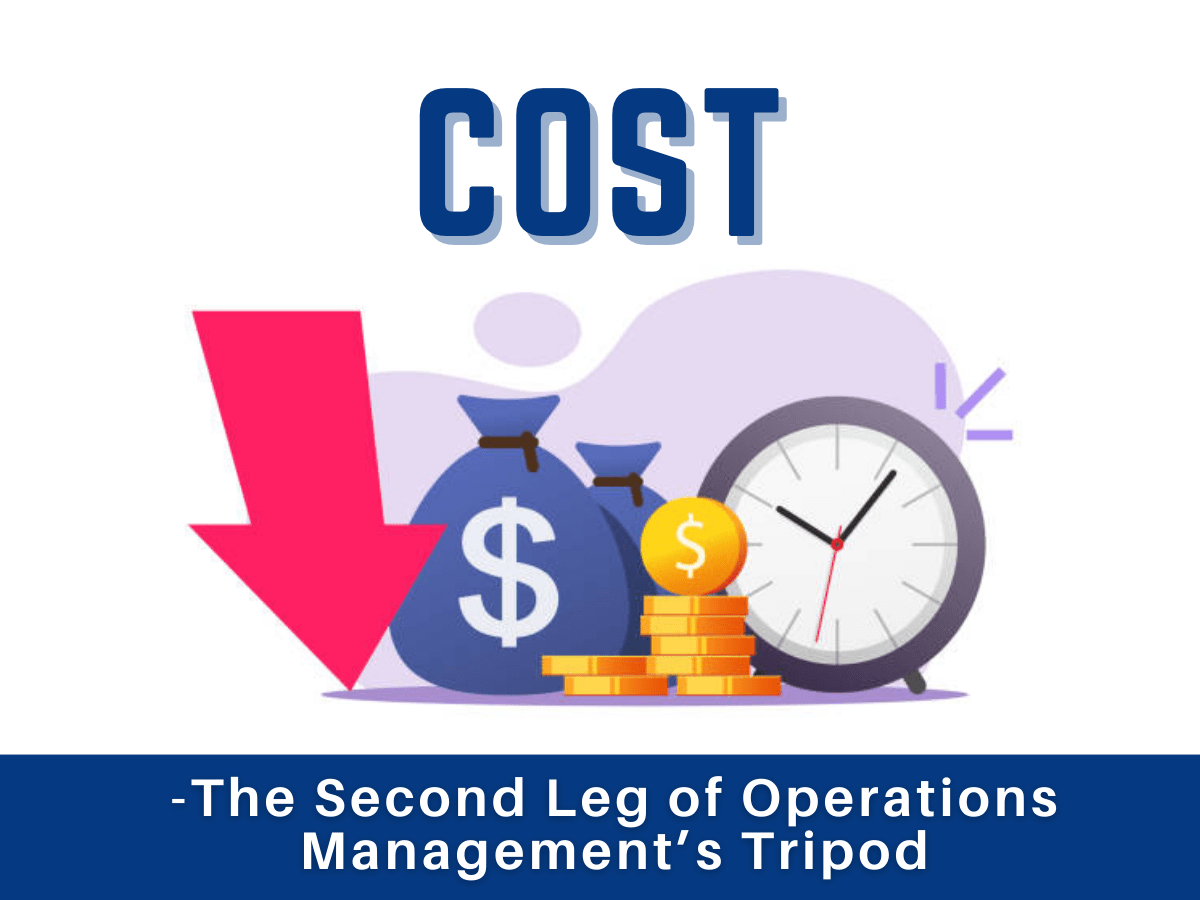Cost - The Second Leg of Operations Management’s Tripod

Gartner finance glossary defines cost management as the process of planning and controlling the costs associated with running a business. It includes collecting, analyzing, and reporting cost information to more effectively budget, forecast and monitor costs. Cost in operations management or operational cost, refers to the monetary value associated with the resources used in the production of goods or services. These resources may include raw materials, labor, machinery, and overhead expenses.
Operational cost consists broadly of the following:
- Cost of goods sold (Production cost) Also known as the cost of revenue from operations.
- Labor costs
- Sales costs to induce more sales.
- Depreciation of the fixed assets
- Amortization expenses
- Administration costs
- Maintenance costs
- Other related costs that are directly related to the production function.
Effective cost management therefore involves minimizing these expenses while maintaining the quality of the final product or service. Effective cost management ensures that the organization is producing goods or services at the lowest possible cost without compromising quality, an essential requirement for the long-term sustainability and growth of any organization. By managing costs effectively, organizations can improve their profit margins, remain competitive in the market, and reinvest the savings into other areas of the business. Additionally, managing costs can help organizations avoid financial distress, maintain a positive reputation in the market, and build customer loyalty.
The Importance of Cost Management:
A classic example of the importance of cost management is the story of McDonald's. The company became a giant in the fast-food industry by implementing a system that streamlined its operations, reduced waste, and managed costs effectively. By optimizing its processes, McDonald's was able to offer quality food at a low price, making it accessible to a wide range of customers. As a result, McDonald's grew into one of the largest and most successful fast-food chains in the world.
The McDonald’s Success Story
The brothers—Mac and Dick McDonald—had started the fast-food stand in 1940 but didn’t achieve real success until eight years later. It was then that they turned the kitchen into a mechanized assembly line—with each step in the cooking process being stripped down to its essence and accomplished with minimum effort. They got rid of the carhops and indoor seating, replacing them with a system where customers would order directly through outdoor service windows. By concentrating their efforts on keeping costs down, the brothers could maintain low prices for a consistently good product. This inevitably led to a high rate of customer turnover. “Our whole concept was based on speed, lower prices, and volume,” Dick McDonald recalled. “We were going after big, big volumes by lowering prices and by having the customer serve himself… read on.
Strategies for Managing Costs:
Cost management plays a crucial role in the success and sustainability of organizations by directly impacting their profitability and competitiveness. To achieve these goals, organizations must implement effective cost-management strategies that can help them optimize their resources and operations.
Effective cost management requires a multifaceted approach. Here are some practical strategies that organizations can use to manage costs:
- Value Engineering: This involves analysing each aspect of the production process and identifying ways to reduce costs without compromising quality.
- Supply Chain Management: Organizations can work closely with suppliers to negotiate better prices, reduce lead times, and improve the quality of raw materials.
- Forecasting and Budgeting: By forecasting demand and budgeting expenses, organizations can manage their costs effectively and avoid overspending.
Other ways of managing costs may include:
- Integrating technologies that promote efficiency.
- Outsourcing operations if possible
- Paying invoices early and enjoying discount offers
The importance of managing cost in the operations of any business, big or small, cannot be overstated. By adopting the cost management strategies outlined here, organizations can better manage their operations to minimize costs, unnecessary expenses, increase their profit margins. Adopting these measures will also help them to remain competitive in their respective markets, attract and retain customers to achieve long-term success.
Have thoughts about this topic? We encourage you to share your thoughts and opinion in the comments section below. Your contributions can enrich the conversation and provide valuable perspectives for others to learn from.
Let's work together to create a space that fosters learning and growth in our management journeys. Thank you for taking the time to read and participate in this discussion.
Our cost management seminars cover topics ranging from cost analysis, budgeting, financial forecasting, cost control, and more. We also offer both virtual and in-person events so that you can maximize your learning opportunities in any environment.
Follow this link to check out our upcoming events today and start expanding your knowledge of cost management.






0 Comments